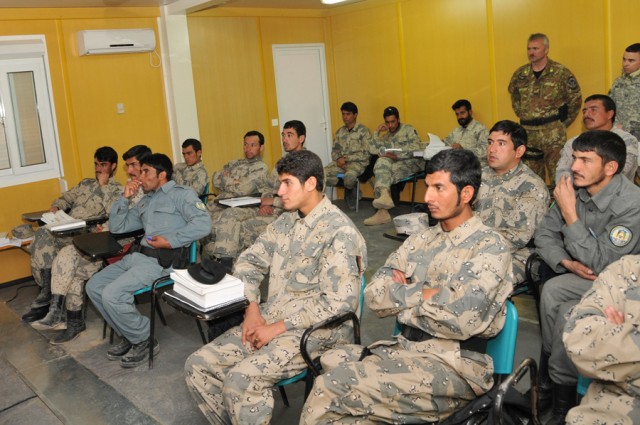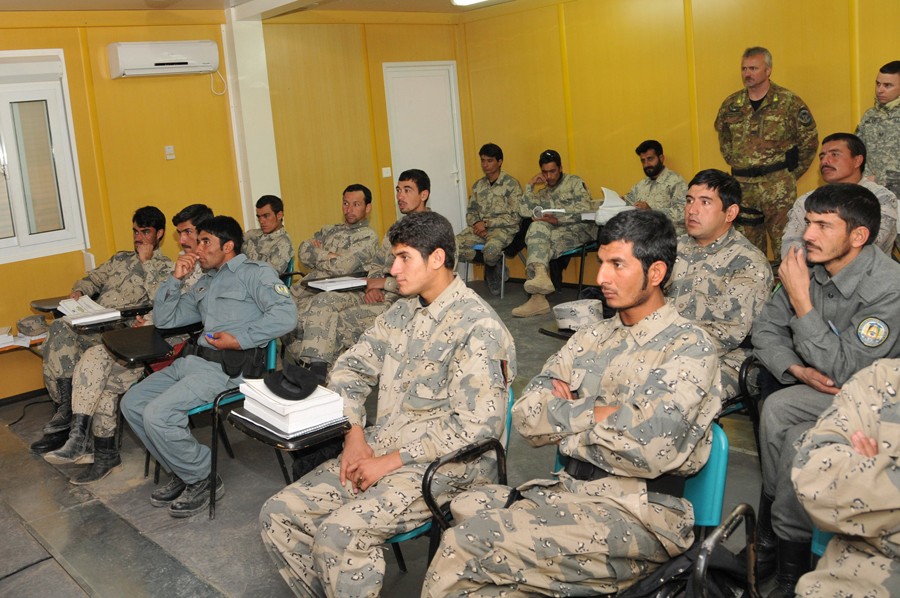
HERAT, Afghanistan (Army News Service, Dec. 2, 2010) -- Resounding shouts of "Sir!" rang out across the courtyard as Chief Inspector Antonio Vincenieli, Italian Guardia di Finanza, read through his class roster and each recruit snapped to attention and rushed forward to receive issued uniform items.
This was only day four for this particular class, and they'd have to endure 14 more weeks of recruit training before becoming Afghan Border Police (ABP) agents.
Later that day, Class No. 34 recruits wolfed down their lunch hastily as Italian and American mentors commented on how much the spectacle reminded them of their own basic training.
Fortunately for the coalition troops, recruitment training was historic enough that each brought years of experience to the training center, and that knowledge allows them to train the ABP recruits in a manner that eventually the ABP agents will be able to secure Afghanistan's borders without coalition assistance.
Through an interpreter, one trainee explained what prompted him to enlist in the ABP.
"We can see unprecedented improvements to what this nation was like three years ago," said Agent Sultan Ahmad Faizy, a senior trainee attending the final phases of ABP training. "People are now stepping up to serve their country. This service is vital to bring eventual stability and peace to all of Afghanistan."
Afghans are already beginning to assume many duties previously held exclusively by coalition troops.
For an example, an increasing amount of recruit training is now being taught by experienced Afghans, and supported by a staff of 30 Carabinieri (Italian National Police), eight Guardia di Finanza (Financial Guard) and a small team of U.S. Army Soldiers, who provide logistical support.
Recruits typically start their days at 4:30 a.m. with prayer, followed by drill throughout the morning until a 7:30 a.m. formation. After the formation, they spend the rest of their mornings and afternoons either partaking in hands-on training, combative exercises, or in the classroom learning: Afghan Constitution, penal codes, criminal codes, customs law, police law, bank law and border policing procedures.
Overseeing all aspects of their training is Italian Lt. Col. Stefano Izzo, Task Force Grifo commander.
"We are preparing these recruits to be able to secure their borders with Iran and Turkmenistan on their own," said Izzo. Recruits from other regions near other borders are trained at separate centers.
"These recruits work very hard with the supplies Italy has provided them," continued Izzo. "We're very proud of their progress. More importantly, they are proud of what they accomplish, which will show in their duties."
A major problem the mentors face is a low-literacy rate among recruits.
"Of about 300 recruits in the prior class, only about 60 were literate," said U.S. Army Staff Sgt. Brian Cureton, Combined Training Afghan Group Police (CTAGP) noncommissioned officer in-charge.
With reading obviously being very important to police work, Italian Capt. Antonio Chiofalo, Training Element chief, said that new measures were recently implemented to counter the problem.
"We recently added a four-week Dari literacy course," he said. "We are also incorporating more Afghans into the training process to help curb the language barriers."
Currently a typical training session goes like this: Speaking English, an Italian mentor offers a course of study, sentence by sentence, to an interpreter. Next, the interpreter has to understand the Italian mentor's English, then translate that into Dari for the class to comprehend.
On the occasions when recruits are Pashtun-speaking rather than Dari, a separate translator must be summoned to tailor to them.
Chiofalo recently started a new Afghan Instructor Course that helps counter some of these issues. Many have already passed the unique course and are currently instructors.
To accommodate the instructor course students plus an influx of new ABP recruits, the training compound is expanding, said U.S. Army 1st Lt. Jonathan Kleinfelt, Regional Command-West's liaison to CTAGP.
"New dining facilities, barracks, storage and training areas are being built, allowing an increase from 300 students to 850 by the end of January of 2011," he said.
The end goal for the training center and ABP operations is self-sustaining forces, said Chiafolo.
"We work tirelessly here and are fully committed to the progress of ABP operations," said Chiafolo. "I dream that someday this land is stable to the point that Afghan can police their own population and secure their own borders. At that time, I'll be sure I can go back to Bolzano (Italy) with the knowledge that I did my job here, and that my own children will not have to come back here to finish what we started."
Related Links:
STAND-TO!: NATO Training Mission-Afghanistan

Social Sharing